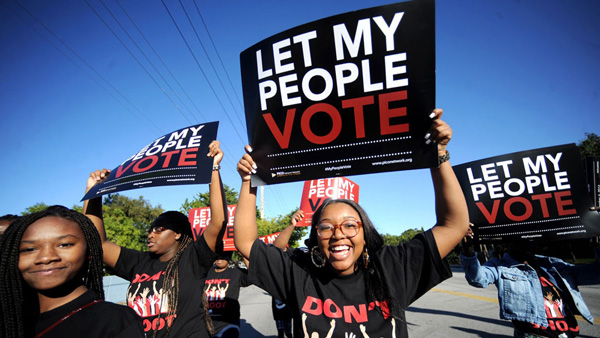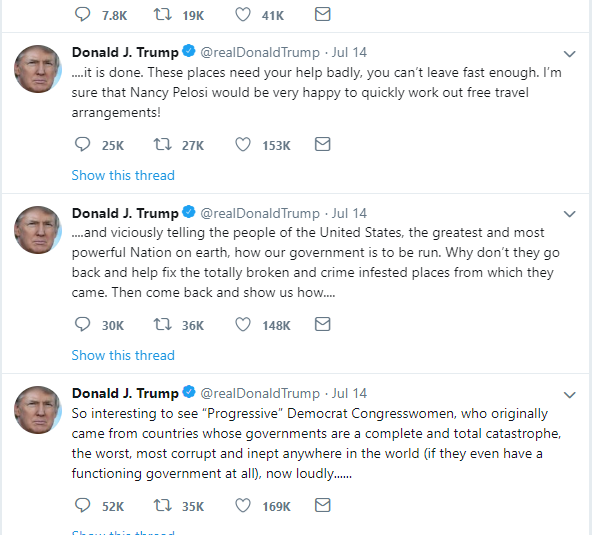Snips from an ongoing national conversation —
In What Americans Do Now Will Define Us Forever, Adam Serwer describes the futile attempts of the conservative intelligensia to either distance themselves from Trump or provide a respectable fig leaf over whatever it is he is doing.
The [National Conservatism] conference stood solidly within the conservative intellectual tradition, as a retroactive attempt by the right-wing intelligentsia to provide cover for what the great mass of Republican voters actually want. Barry Goldwater did not break the Solid South in 1964 because the once Democratic voters of the Jim Crow states had suddenly become principled small-government libertarians; voters who backed Donald Trump in 2016 did not do so because they believed a nonracial civic nationalism had been eroded by liberal cosmopolitanism.
Likewise, Ronald Reagan’s appeal to blue collar whites in 1980 had less to do with his sunny disposition than with their belief he was going to take food stamps away from the “Welfare Queens.” The connection between the “conservative intelligensia” and the mass of Republican voters is a complicated thing that shifts over time, but the two are rarely on the same page.
Trump’s nationalist innovation is not taking pride in his country, supporting a principled non-interventionism, or even advocating strict enforcement of immigration laws. The only thing new Trump brings to the American nationalism of recent decades is a restoration of its old ethnic-chauvinist tradition. Conservative intellectuals cannot rescue nationalism from Trump, any more than they could rescue Goldwater from Jim Crow, because Trump’s explicit appeals to racial and religious traditionalism, and his authoritarian approach to enforcing those hierarchies, are the things that have bound conservative voters so closely to him. The failure of the conservative intelligentsia to recognize this is why it was caught so off-guard by Trump’s rise to begin with.
They’re still off guard, seems to me.
The argument that Omar’s criticisms of her adopted country for failing to live up to its stated ideals justify revoking her citizenship substantiates the very criticism she lodged. Trump has said, “If you hate our country, or if you are not happy here, you can leave!” but his entire 2016 campaign was premised on the idea that many Americans not only are deeply unhappy, but also have every right to demand that things be better. That Trump’s supporters believe Omar’s sins justify her banishment, and Trump’s similar transgressions justify his presence in the White House, helps illustrate exactly what is going on here. Under Trumpism, no defense of the volk is a betrayal, even if it undermines the republic, and no attack on the volk’s hegemony can be legitimate, even if it is a defense of democracy.
Although the German word volk can have a more benign meaning, I suspect Serwer is using it in the sense of the Nazi Idea of Volksgemeinschaft — a nation or people made up of the “most superior” of the human races. From the article on the subject:
The Volksgemeinschaft didn’t just exclude different races, as competing ideologies were also rejected. The Volk was to be a one party state where the leader—currently Hitler—was accorded unquestioning obedience from his citizens, who handed over their freedoms in exchange for—in theory—their part in a smoothly functioning machine. ‘Ein Volk, ein Reich, ein Fuhrer’: one people, one empire, one leader. Rival ideas like democracy, liberalism or—especially repugnant to the Nazis—communism was rejected, and many of their leaders arrested and imprisoned. Christianity, despite being promised protection from Hitler, also had no place in the Volk, as it was a rival to the central state and a successful Nazi government would have brought it to an end.
Sound familiar? As Trump has done, Hitler forged an alliance with conservative elements of Christianity, who praised and supported him, but it’s the consensus of historians that he would have dismantled the Church once he no longer needed it.
Now, back to Serwer:
Faced with the president’s baldly expressed bigotry toward four women of color in Congress, Republicans turned to reporters to argue that his attacks are part of a clever political strategy, elevating four left-wing women of color into the faces of his opposition. I suspect these Republicans, and some political reporters, believe that this somehow exonerates Trump from the charge of bigotry, as though prejudice ceases to be prejudice if it becomes instrumental. In fact, the admission that fomenting racism and division is central to Trump’s strategy is a stunning rebuke to those political reporters and pundits who, for four years, have insisted that the rise of Trump is about anything else. Trump and his most ardent liberal critics are in full agreement about the nature of his appeal, even as they differ on its morality. Only the Trumpists, and those who wish to earn their respect, fail to see it.
“He’s not racist if he’s just fomenting racism to serve his own ends” is not something I’m going to dignify with a counter-argument. See also John Cassidy, There Is Nothing Strategic About Trump’s Racism:
To restate the obvious: the President is unpopular. Despite this, it is often argued that he knows what he is doing, and he’s concentrating on turning out his base of disaffected white voters, particularly those living in the Midwestern states that tipped the Electoral College his way in 2016. In an analysis posted on Friday, Nate Cohn, the Times’ election analyst, argued that, given Trump’s advantage in the Electoral College, he “could win while losing the national vote by as much as five percentage points.”
But, even for a candidate focussing on the Electoral College rather than the popular vote, Presidential contests aren’t merely about motivating the base. To win an election in which more than a hundred and thirty million people vote, a candidate has to make some inroads into the center ground. By adopting the language of barroom bigots everywhere, Trump is narrowing his potential voter pool and incentivizing some key groups whose participation could be key, such as suburbanites in Michigan, minorities in Milwaukee and Philadelphia, and millennials who voted for the Green Party in 2016. Could he still pull out a victory? After 2016, only a fool or an eternal optimist would say it’s inconceivable. He didn’t boost his chances this week, though.
Back to Serwer:
It also speaks to the futility of trying to somehow rescue a Trumpian nationalism from Trump. Racism is at the core of Trumpism. The movement cannot be rescued from its bigotry, and those at the National Conservatism Conference who believe it can are in denial. Conservatives can make their case for limited government, or for religious traditionalism, but as long as it is tied to Trump or Trumpism, it will be tainted. Trump is not a champion of the civic nationalism Hazony and others claim they want to see. He is a mortal threat to it.
Conservative elites come in multiple flavors, such as neocons and small-government libertarians. Trumpism supports none of it. But also note:
In the face of a corrupt authoritarian president who believes that he and his allies are above the law, the American people are represented by two parties equally incapable of discharging their constitutional responsibilities. The Republican Party is incapable of fulfilling its constitutional responsibilities because it has become a cult of personality whose members cannot deviate from their sycophantic devotion to the president, lest they be ejected from office by Trump’s fanatically loyal base. The Democratic Party cannot fulfill its constitutional responsibilities because its leadership lives in abject terror of being ejected from office by alienating the voters to whom Trump’s nationalism appeals. In effect, the majority of the American electorate, which voted against Trump in 2016 and then gave the Democrats a House majority in 2018, has no representation.
Yep. I couldn’t have put it better. And if Trump wins again in 2020, it will be miscalculations by Democratic Party leadership that made it possible, just as their miscalculations made his election possible in 2016. They don’t learn.
Jamelle Bouie writes in Trump Voters Are Not the Only Voters that there are far more anti-Trump voters than pro-Trump voters. Yet, somehow, anti-Trump voters aren’t important.
Trump galvanized his supporters at the cost of energizing the opposition. But somehow, this has fallen out of political memory, with many observers focused on the president’s base of non-college-educated whites as the only voters who matter. And that includes some prominent Democrats. House Speaker Nancy Pelosi’s opposition to serious and aggressive oversight of the president — up to and including impeachment — is arguably tied to a belief in the singular importance of these voters. They must be catered to, even if it angers and disillusions the Democratic base. …
… African-Americans are the most heavily Democratic group in the country, with a large presence in many of the most competitive states. Small increases in their participation would have an outsize effect on the electoral landscape. The projections bear that out. Given population growth since the last election, if black turnout and support return to 2012 levels, Democrats win handily, with as much as an estimated 338 electoral votes and a five-point margin in the national popular vote.
I have seen news analyses saying that Trump has lost support among blue collar voters in the upper midwest, which suggests that a portion of people who voted for Trump in 2016 know better now. On the other hand, as David Atkins argues, people who still support Trump today are not going to be persuaded by appeals to “centrism.” Those people are all in for Trump. Dems need to stop dreaming they can be won back. Let them bleeping go.
Similarly, Charles Blow wrote back in April,
But there is part of the Biden enthusiasm, and to a lesser extent the energy around candidates like Bernie Sanders, that focuses too heavily on the fickle white, working-class swing voters and is not enough focused on the party’s faithful.
Indeed, in political circles, Biden’s chief attribute in this election feels like his apparent appeal to these white voters.
I think that we need to question why the presence of the white male elder seems to ease anxiety among these white voters, and why the Democrats seem to be banking on that.
Barack Obama ran phenomenal campaigns in 2008 and 2012, and there is no doubt that choosing Biden, an elder white man, helped grease the skids among a certain section of white working-class voters. But, these are the same people who in the next breath — or next election — could reverse course and vote for a flagrant white supremacist.
These people are not experiencing conversion, they are being coddled. Democrats want to hold constant their support from women and minorities even as they chase the votes of people hostile to the interests of women and minorities. What does it say that the Democrats lust after disaffection rather than rewarding devotion? Democrats tell their base that this must be done, that the prodigal children must be brought home, as if that is their only path to victory. It is not. That is a lie. And, it’s a lazy lie.
Back to Jamelle Bouie:
You could make a strong case that the future success of the Democratic Party depends on its ability to mobilize and win over black Americans, a key group in a broad coalition of voters. We have post-Obama proof that this is true from the 2017 elections — where strong black turnout drove those Democratic victories in Virginia and Alabama — as well as in the 2018 midterms, where greater support and participation from black voters put black candidates within striking distance of statewide victories in Georgia and Florida.
But the press isn’t hyper-solicitous of the views of black voters. Cable news doesn’t constantly turn to swing-state focus groups of black Democrats to gauge their opposition to the president. And Democrats in Congress aren’t worried about demobilizing a group that may determine the next election. Just the opposite — some moderates believe the party has spent too much time challenging the president’s racism and showing solidarity with their nonwhite constituents.
See also Bouie’s The Joy of Hatred and This Is What Evil Looks Like from the Mahablog archives.
In Trump Sets the Terms on Racial Division. Do Democrats Know What to Do?, Astead W. Herndon and Jennifer Medina write,
But even as Democratic candidates universally denounced Mr. Trump’s comments, they did not agree on how the eventual presidential nominee should combat the racial division embedded in those words. Do you, on the campaign trail, talk directly about the president’s inflammatory language, racism and discrimination in this country? Or do you talk about jobs and the economy?
Democratic Party leaders, particularly establishment figures with ties to Barack Obama’s and Hillary Clinton’s presidential campaigns, have largely followed a strategy of careful avoidance: responding to the president’s most inflammatory moments, while attempting to redirect the political debate to what is often described as “kitchen table” issues, such as health care and wages.
However, an increasingly vocal group of Democratic grass-roots organizers and pollsters believe that Mr. Trump’s words and legislative actions amount to a cohesive playbook of white identity politics, meant to court white voters of all economic tiers around the idea that their fates are linked, and are under threat by an increasingly diversifying America. They argue that racism and the public performance of it is a “kitchen table” issue for many voters — black and white — that must be dealt with head-on.
“Just as much time and resources as the nominee spends on targeting and messaging around health care and wages and climate change, they should spend an equal amount of resources around an alternative racial vision for the country,” said Cornell Belcher, a prominent pollster who worked with Mr. Obama. “This isn’t a goddamn distraction.”
Herndon and Medine quote Sen. Cory Booker: “This election will be a referendum, not on Donald Trump, but a referendum on who we are and who we must be to each other.” It is time for Democrats to decisively choose to stand wholeheartedly with nonwhite voters and to let the fickle racist white voters go. I believe — I sincerely hope — the majority of white Americans will see the rightness of the Democratic Party’s position and will vote for Democratic candidates against the fascists.
“This is how low Trump has taken us. We are a debased nation fighting over the scraps of our former principles,” writes Timothy Egan. Are there enough of us to put an end to the disease of Trumpism? That’s the test of our time.







